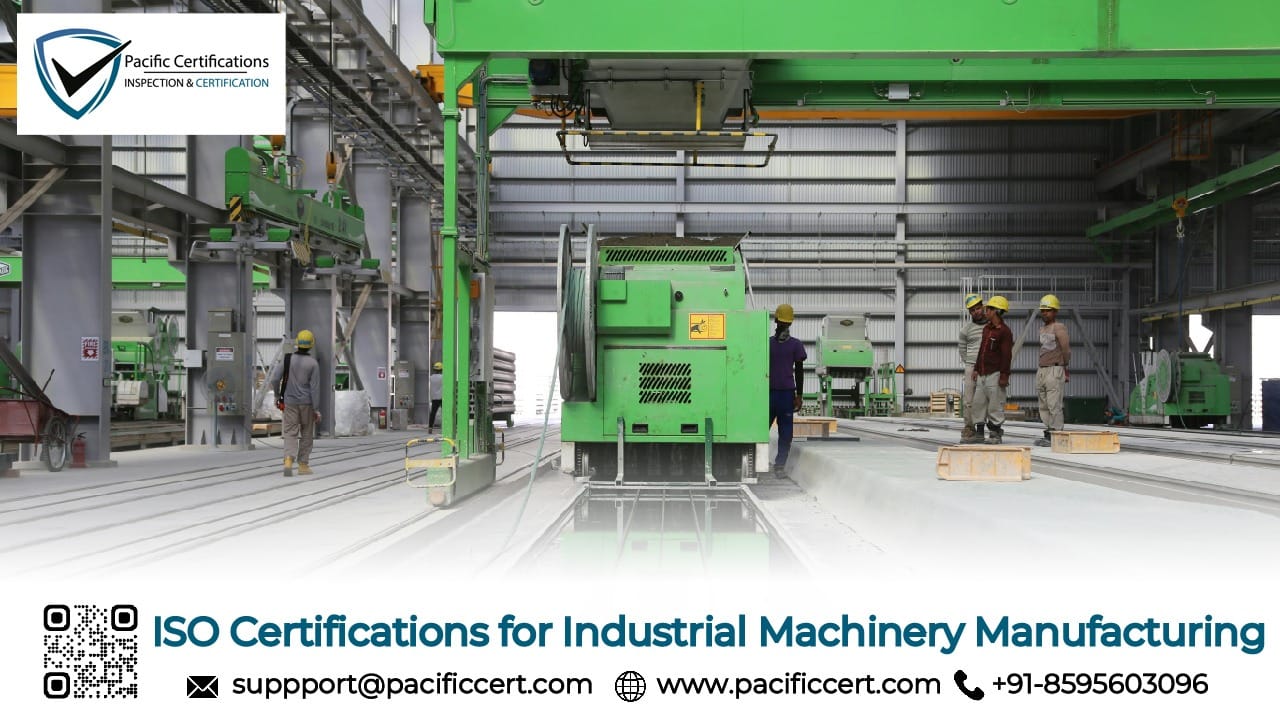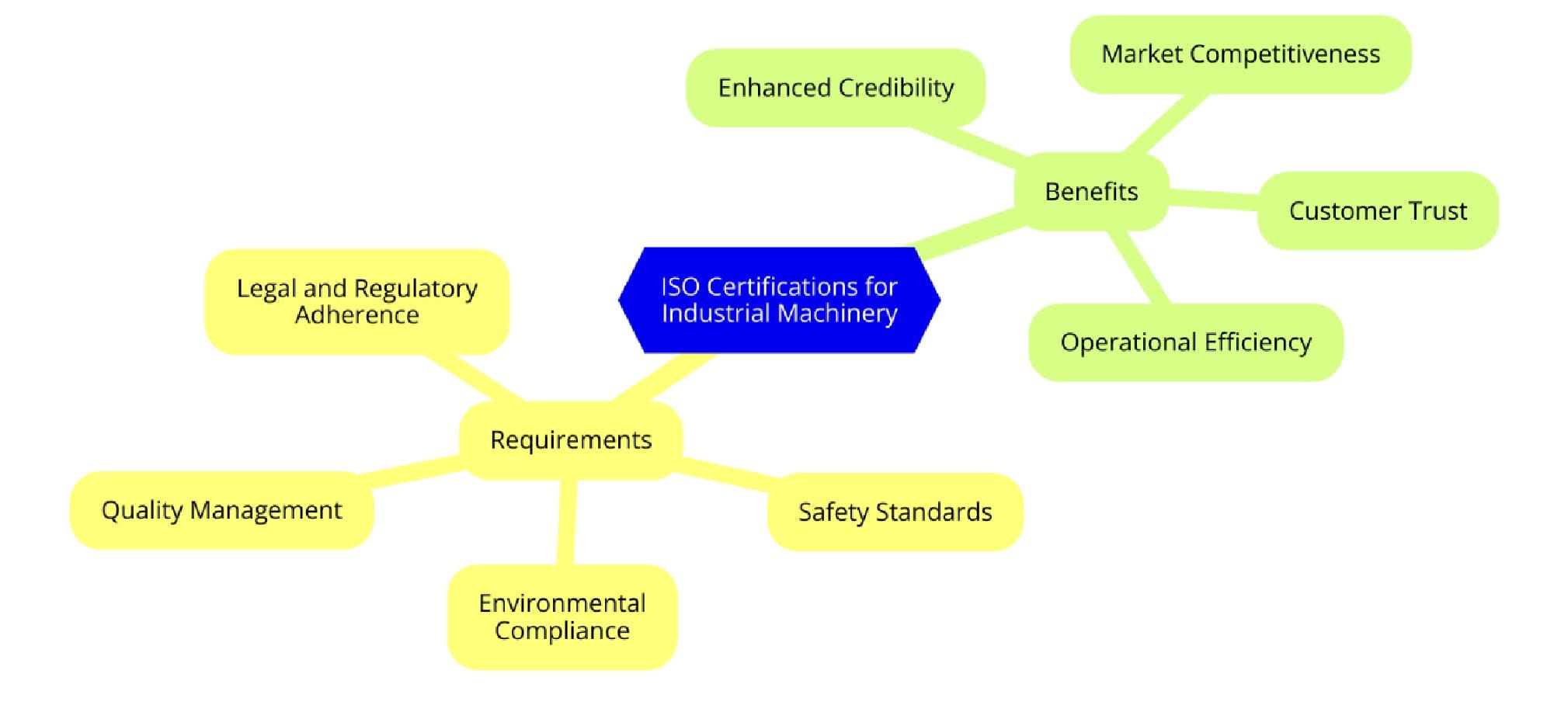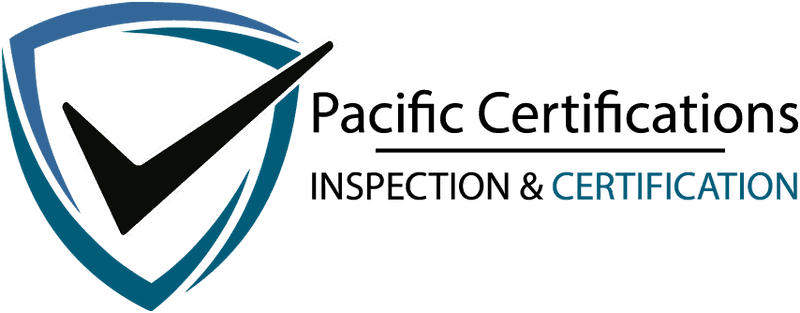ISO Certifications for Industrial Machinery Manufacturing Businesses, Requirements and Benefits

ISO Certifications for Industrial Machinery Manufacturing
In an era where quality and safety are paramount, ISO Certifications for Industrial Machinery Manufacturing have become vital. These globally recognized standards set benchmarks for product quality, efficiency, and regulatory compliance, helping businesses establish trust in competitive markets.
ISO certifications align businesses with international best practices, driving consistent improvement and customer satisfaction. Industrial machinery manufacturers, in particular, benefit immensely by showcasing their commitment to precision, durability, and safety, cornerstones of their industry.

ISO standards serve as frameworks that help industries meet critical benchmarks, from product design to environmental sustainability. For industrial machinery manufacturing, these standards ensure machinery performs reliably under diverse operational conditions. They also mitigate risks by enforcing rigorous quality checks.
ISO standards aren't just about compliance—they are tools for transformation. With structured guidelines, manufacturers can improve process efficiency, reduce waste, and enhance product durability in a global market.
Reach out to our experts by emailing [email protected] for personalized assistance with your ISO certification needs.
Applicable ISO Standards for Industrial Machinery Manufacturing
Understanding the ISO standards relevant to industrial machinery is essential for achieving compliance and fostering continuous improvement. Below are the key ISO certifications tailored to this industry:
ISO 9001: Quality Management System (QMS)
- Establishes a structured approach to delivering consistent, high-quality products.
- Focuses on customer satisfaction, process efficiency, and continual improvement.
ISO 14001: Environmental Management System (EMS)
- Ensures sustainable practices by reducing environmental impact.
- Aids in compliance with environmental laws, fostering eco-conscious manufacturing.
ISO 45001: Occupational Health and Safety (OHS)
- Prioritizes worker safety and workplace conditions.
- Reduces the likelihood of accidents and improves workforce morale.
ISO 50001: Energy Management Systems (EnMS)
- Helps manufacturers optimize energy use.
- Reduces operational costs and enhances energy efficiency.
- Guides the identification, assessment, and mitigation of risks.
- Ensures businesses are prepared for market uncertainties.
ISO 13485: Quality Management for Medical Devices
For manufacturers producing medical-grade machinery, ISO 13485 outlines requirements for ensuring safety and reliability in medical equipment.
ISO 12100: Safety of Machinery
- Focuses on machinery safety by establishing a framework for risk assessment and hazard mitigation.
- A cornerstone standard in preventing accidents and ensuring operational safety.
Click here to find out more applicable standards to your industry
At Pacific Certifications, we simplify the path to achieving ISO certifications for industrial machinery manufacturing. Our team conducts audits to verify compliance with ISO standards, ensuring your processes, systems, and products meet the rigorous requirements.
We are committed to delivering impartial and efficient certification services. Dial +91-8595603096 to connect with our certification professionals and explore the steps to achieving ISO compliance.
Requirements of ISO Certifications for Industrial Machinery Manufacturing
Below are the specific requirements for each relevant ISO standard, focusing on what industrial machinery manufacturers need to address for compliance.

ISO 9001: Quality Management System (QMS) Requirements
- Identify internal and external factors affecting quality objectives.
- Commitment to a quality-focused culture from top management.
- Define quality objectives and risk management strategies.
- Provide necessary resources, including skilled personnel and infrastructure.
- Ensure effective product design, development, and delivery processes.
- Monitor and measure performance through internal audits.
- Implement corrective actions for non-conformities.
ISO 14001: Environmental Management System (EMS) Requirements
- Develop an environmental policy committed to sustainability and compliance.
- Identify environmental aspects and impacts of manufacturing activities.
- Set objectives for reducing environmental footprints.
- Integrate environmental management practices into daily operations.
- Establish emergency preparedness plans for environmental incidents.
- Regular monitoring and measurement of environmental impacts.
- Evaluate performance outcomes and refine environmental strategies.
ISO 45001: Occupational Health and Safety (OHS) Requirements
- Top management must demonstrate commitment to workplace safety.
- Encourage active participation of workers in safety initiatives.
- Identify potential workplace hazards and assess risks.
- Implement preventive and control measures.
- Develop procedures to manage safety risks effectively.
- Conduct safety training and awareness programs.
- Create and test emergency response plans.
- Regularly update safety protocols based on feedback.
- Measure safety performance metrics and report incidents.
- Use data-driven insights to improve safety standards.
ISO 50001: Energy Management System (EnMS) Requirements
- Develop a policy focused on energy efficiency and sustainability.
- Conduct energy reviews to identify consumption patterns.
- Establish energy performance indicators (EnPIs).
- Set clear energy objectives and action plans.
- Optimize energy usage in machinery and manufacturing processes.
- Track energy performance and benchmark against goals.
- Use findings to identify further opportunities for energy savings.
- Periodically review energy management plans for effectiveness.
ISO 12100: Safety of Machinery Requirements
- Identify potential hazards associated with machinery use.
- Evaluate risks and establish controls.
- Incorporate inherent safety features during machinery design.
- Ensure compliance with safety regulations in all machine operations.
- Maintain detailed documentation of safety measures and operational limits.
- Provide user-friendly operating instructions.
- Test machinery under realistic operating conditions.
- Validate safety measures to ensure reliability.
Implementing these specific requirements enables industrial machinery manufacturers to ensure compliance, enhance operations, and meet stakeholder expectations.
Send your queries to [email protected] to receive comprehensive guidance on your ISO certification journey.
Benefits of ISO Certifications for Industrial Machinery Manufacturing
Committing to ISO certifications brings transformative advantages, including:

Product Quality: ISO standards prioritize consistent quality, minimizing defects and recalls, while boosting customer satisfaction.
Efficiency: Streamlined processes and structured workflows lead to reduced downtime and cost savings.
Market Competitiveness: ISO-certified manufacturers enjoy better credibility in global markets, often gaining an edge in government and international contracts.
Regulatory Compliance: Adhering to ISO standards ensures compliance with global regulations, reducing legal and operational risks.
Environmental Stewardship: Standards like ISO 14001 and ISO 50001 help minimize environmental footprints, aligning businesses with sustainable practices that resonate with modern consumers.
As of 2024, the demand for ISO certifications in industrial machinery manufacturing is at an all-time high, driven by increasing consumer focus on sustainability and product quality. Emerging markets are adopting ISO standards to meet international trade requirements.
Recent research highlights that companies investing in ISO certifications report up to 40% improvement in customer retention. With Industry 4.0 integration, the emphasis on ISO 50001 (energy efficiency) and ISO 45001 (worker safety) is gaining traction to align with smart manufacturing practices.
Pacific Certifications is accredited by ABIS, in case you need support with ISO certification for your Industrial Machinery Manufacturing business, please contact us at [email protected] or +91-8595603096.
FAQs: ISO Certifications for Industrial Machinery Manufacturing
What are ISO certifications for industrial machinery manufacturing?
ISO certifications are internationally recognized standards ensuring quality, safety, and environmental responsibility in industrial machinery manufacturing.
Which ISO certifications are most relevant for this industry?
Key certifications include ISO 9001 (Quality), ISO 14001 (Environment), ISO 45001 (Safety), and ISO 12100 (Machinery Safety).
How does ISO certification benefit machinery manufacturers?
ISO certifications improve product quality, operational efficiency, market credibility, and regulatory compliance, offering long-term advantages.
What is the role of Pacific Certifications in the certification process?
Pacific Certifications conducts audits and issues ISO certifications, verifying compliance with the relevant standards.
Is ISO 50001 applicable to industrial machinery manufacturing?
Yes, ISO 50001 helps manufacturers enhance energy efficiency, reduce costs, and meet environmental goals.
How can I start the ISO certification process?
Reach out to Pacific Certifications at [email protected] to initiate the certification process with our expert audit services.
Read More at: Blogs by Pacific Certifications

